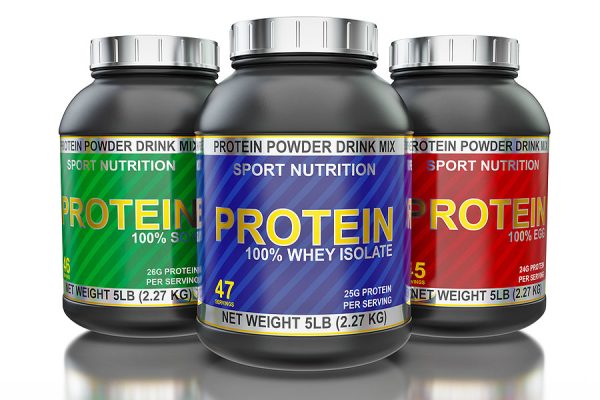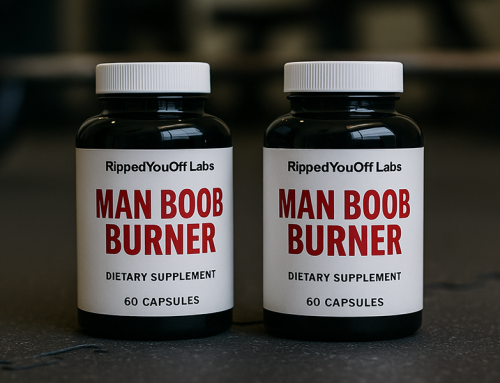Q: “Tom, I came across a couple of videos on You Tube and on Instagram claiming that whey protein is a highly processed food and therefore it’s unhealthy. Both were made by influencers who appear knowledgeable and reputable. I’ve been following you for years so I know you’re a not a fan of supplements, but that you do like protein powder for supplemental protein and for flavor in some of your recipes. Could you address the claims that were recently made about whey being unhealthy due to heavy processing?”
Read on for the answer…

A: Here’s the short answer: Yes, whey protein is a processed food. But it’s not an ultra-processed food in the sense that nutrients are stripped and a lot of unhealthy ingredients are added. So no, whey is not unhealthy. To the contrary, a huge body of research confirms whey protein safety and links whey protein to health benefits and better body composition.
Now, if you’d like to hear the long and detailed answer, including the evidence and 23 scientific references I listed confirming that my answer is correct, read on.
This is not a new topic. I’ve heard the case made against whey protein years ago before social media, from people who were big advocates of only eating whole food. But…
1. The claim that “you shouldn’t consume whey because it’s processed” is a half-truth a best.
2. The claim that “whey is unhealthy” is completely false.
Also keep in mind that some of the anti-whey sentiment comes from vegans (whey is an animal-based protein). Meanwhile, it’s the plant proteins, not whey, that have recently singled out for high levels of contaminants like lead.
Whey protein can be a helpful supplement, one of only a handful worth taking in my opinion. It also has confirmed health and body composition benefits. I’m not involved in the supplement industry, so I have nothing to gain by saying this. I’m simply stating the facts about this one supplement based on scientific evidence.
Let me backtrack a moment and first explain what whey is and what kinds there are, and then I’ll review some of the science supporting the idea that whey is a healthy food.
First of all, what is whey protein and is it processed?
Whey is one of the two types of protein in milk. The other is casein. Whey makes up 20% of the protein in milk, and casein the other 80%. Some types of protein powder are 100% whey. Others are 100% casein. Whey is a thinner, faster digesting type of protein, while casein is much thicker and slower digesting. It’s also common to see a whey and casein blend, which is pitched as offering the best of both worlds.
Whey is the most popular protein powder in the world. In the USA, the annual sales were nearly $5 billion in 2020, and this is projected to reach to $6.6 billion by the end of 2025.
Many people know that whey is a by product of the cheese making process, and is obtained by coagulating and removing the curd (casein). The end product is the protein powder you see sold in tubs or packets. Whey is also sold as ready-to-drink (RTD) liquids in bottles. All of this means that yes, whey is a “processed” food.
Whey is sold as concentrate, isolate or a combination of the two. In the manufacture of whey protein isolate, almost all the carbohydrate from lactose (milk sugar) is removed. That means whey isolate is even more processed to make it more pure. Whey isolate is usually more expensive, but some people believe it’s worth it, not just for the higher purity, but also because people with lactose intolerance may be able to handle it.
Some brands may put different types of additives, sugar, or fat in their proteins as well, especially the bottled protein drinks, so you should always check labels in case there might be a not so nutritious ingredient in there that you want to avoid.
For this reason, I usually stick with the powders that don’t have any additives except a sweetener. I’ll circle back to that in a minute.
So we can see that whey protein is processed, but the important distinction is that it’s not necessarily processed in an unhealthy way.
Foods such as raw whole fruits and vegetables are the ones considered totally unprocessed. You eat them the way they came off the tree or out of the ground. /
Naturally, we should aim to eat lots of them because they are unquestionably healthy. But this doesn’t mean all processed food is unhealthy and we must avoid all processed food. There are multiple levels of processing, ranging from very lightly processed to ultra processed.
Ultra processed foods are the kind to avoid most of the time. Which foods are ultra-processed is mostly common sense. They include soda, chips, doughnuts, candy, sugary breakfast cereals, pastries, cake, and white bread.
These types of foods are heavily processed in a way that has stripped them of valuable nutrients. They often include a combination of unhealthy fats, high amounts of refined sugar, and salt.
In addition, ultra-processed foods are often infused with artificial ingredients and flavor enhancers which make them more palatable. So palatable and hard to stop eating in fact, that one study (Kevin Hall, 2019) found people eating a diet high in ultra processed food ate 508 calories more per day in an ad libitum diet, and were more likely to become overweight or obese. This alone increased their risk for many health problems.
Many foods that are considered among the healthiest undergo at least some degree of processing. Let me give you an example of one I eat almost every day – old-fashioned oatmeal (rolled oats).
The whole oats are de-husked, steamed, rolled, and toasted before being packaged for consumption. Those four steps are a type of “processing,” but it’s not the kind of processing that makes a food less nutritious or less healthy, it simply makes it cook more quickly into a breakfast “porridge” with a certain texture. There is only one ingredient in this product: oats.
Is whey protein healthy?
In a similar way, whey protein is processed, but not in the sense that unhealthy ingredients are added or healthy nutrients are removed. Once the whey has been separated, it still contains almost all the vitamins and minerals as well as numerous protein subfractions.
As far back as the 1970’s, food scientists knew about some positive nutritional properties of whey, but in those days it wasn’t used as a protein supplement yet. In fact, this yellow-green liquid (raw whey), was once considered a waste product of the dairy industry and was actually looked at as a disposal problem.
The earliest types of whey protein were only available in a heat-processed form which were highly denatured. As more advanced methods were developed to process the protein, it became more widely available in large quantities and not only more palatable for commercial use, but the newer processing technology made whey more nutritious since the protein quality was higher and other nutrients were not removed or damaged in the processing.
Whey protein that’s been treated with modern processing methods is a high-quality source of protein that’s easily digestible and quickly absorbed. It has a high branched chain amino acid (BCAA) content and a high biological value (BV). This means that the amino acid ratio is excellent for building muscle and that a large proportion of the protein consumed is absorbed and utilized by the body.
Most people think of protein powder merely as a muscle building supplement because it’s a protein/amino acid source. However, whey protein is also a source of many other nutrients, including vitamins and minerals. A 2023 study (Gonzalos-Weller) reported:
“Whey protein supplements are a source of minerals. In the case of magnesium, calcium, and potassium, the levels in these products are high, and protein supplements could be considered relevant dietary sources of these nutritional elements.”
Whey contains undoubtedly healthy nutrients and minerals, but in the past, opponents of whey protein and media fear mongers have raised a concern: What if whey contains other substances, notably heavy metals, that could be toxic in high enough amounts?
This made national news as far back as 2010, so until this was thoroughly researched, there was a whey protein / heavy metal scare for a while. I took note of it because I’ll be the first person to say that I use protein powder almost daily but I don’t want to consume large amounts of heavy metals. Yet right from the start I wasn’t convinced this was a concern because I’ve always been aware of the truth: it’s the dose that makes a poison.
Consumer Reports did a popular piece on this the first time in 2010 and showed test results revealing that heavy metals were present, but not in amounts for any concern in most of the products tested. They wrote:
“Even if large amounts (of whey) are consumed daily, the intake of these potentially toxic elements from this dietary source will hardly become a dietary hazard. In the case of the only non-essential element analyzed in the present study (Al), its mean concentration was found to be 7.19 mg/kg.”
In 2025, Consumer Reports released another story about lead in protein powders. But if you actually read the whole story instead of just the sensational headlines on the Internet, you see that the protein powders that were dangerously contamined were plant-based proteins. Whey was not a problem.
A more recent study (Bandara 2020) made the same conclusion. After looking at data from the Clean Label project, they found that whey protein supplements did contain detectable levels of heavy metals, but the amounts were so tiny, they posed no risk. The authors wrote:
“The data in the current study suggest that heavy metal exposure via protein powder supplement ingestion does not pose an increased non-carcinogenic risk to human health. Further, no carcinogenic risk was expected.
This study also confirmed that the plant-sourced protein powder supplements tested had a higher heavy metal burden than animal-based protein powder supplements including whey.
You could probably make a better case that eating large amounts of the whole food protein tuna fish pose a higher risk of heavy metal exposure (mercury). In addition, heavy metals occur in trace amounts in many other whole foods as well. There are reports about arsenic in brown rice, a mostly-unprocessed whole food. But again, the small amount that most people would consume in a day or week is likely no concern.
All of this said, it makes sense not to consume huge quantities of any single food. Eating a variety of mostly-unprocessed foods is a smart best practice to increase chances of getting the whole spectrum of beneficial nutrients while reducing risk of overexposure to any substances that are benign in small amounts normally consumed, but could accumulate when eaten daily in huge amounts for extended periods.
It would also not be acting paranoid to look into whether the brand of protein you use meets label claims, including the absence of concerning amounts of heavy metals. There are third party organizations that do this kind of testing and certify the products as meeting label claims and being free of contaminants (which may also include banned substances).
More Ways That Whey Can Be Healthy
With that potentially legit concern out of the way, here’s another way that whey can be classified as a healthy food. Whey contains numerous protein subfractions that are biologically active, with immune-enhancing properties. Whey’s subfractions include:
Immunoglobulins
Lactoglobulins
Lactalbumins
Lactoferrin
Glycomacropeptides
Bovine serum albumin
Lactoperoxidase
Some researchers speculate that a high concentration of the amino acid cysteine in whey protein is also involved in the improved immune response. More frequently, the credit is given to whey’s apparent ability to increase the antioxidant Glutathione. Glutathione is important not only to reduce oxidative stress but also to boost the immune system.
This research on the whey and immune system connection started getting published as far back as the 1980s on both animals and humans (Buonuos). It has also been known for decades that whey has antiviral, antibacterial, antioxidant, antihypertensive, and hypolipedemic properties (Marshall 2002).
More recent research including a systemic review and meta-analysis (Wirunsawanya, 2018) reported that whey protein supplements improved cardiovascular risk factors (better blood lipids, blood pressure, and blood glucose response) in overweight and obese subjects.
In other research, whey has been studied in the context of chronic fatigue, stress management, ulcer protection, hepatitis, and in the past, even in AIDS and cancer research.
One of the negative claims that’s been made online is that whey is harmful to digestive system health. However, there’s evidence that the opposite is true. A 2017 study (Sanchez-Moya) said that whey protein can enhance the proliferation of probiotic bacteria. It also said whey can act as a prebiotic which supports growth of the good types of microbes in the gut.
One last concern I’ve heard made about whey protein is that it might adversely affect kidney and or liver function. Worries about kidney function and high protein diets in general have circulated for years but are based on a false assumption:
It’s been known for a long time that people with kidney disease are advised by their doctors to eat a lower protein diet because high protein can worsen their condition. But it has also been known a long time that there are no adverse effects of high protein on kidney function in healthy people with healthy kidneys.
There’s no compelling evidence that whey protein poses any risk to kidney or liver health in humans. One scientific review paper put forth that hypothesis (Vasconcelos 2021), but it has been picked apart by the scientific community because it was mostly rat studies and none of the arguments were convincing. Some of the adverse health claims were based on a single study.
For anyone who heard recently about kidney and liver health claims and was concerned, an open access scientific rebuttal paper by Caio Eduardo Goncalves Reis can be seen here.
Is whey “real food?”
The belief some people have that whey is not healthy is often joined at the hip with the belief that whey is not “real food.” That’s probably a big reason why they claim it’s not healthy. “Just eat real food” (or “whole food”) has been a popular refrain since the 2000s – it’s not just a new social media thing. This idea is somewhat ironic for a couple reasons.
One is that if you spend any time reading some of the whey protein research, you’ll see that many scientists and clinicians not only call whey food, they call it a “functional food.” “functional” because it has bioactive properties. “Food” because it meets every standard definition of food.
Two is that no matter where you look for what is an official definition of “food,” whether that’s in the dictionary or from the positions of various health organizations, whey fits the definition. The fact is, whey protein is food, period.
The “influencers” saying don’t consume whey because it’s not “food” or not “real food” may be implying that it’s not a whole food in it’s original form as found in nature, so they exclude it from things we should eat. But that criteria for choosing food doesn’t hold up under scrutiny. More often it simply reflects the personal bias of an extreme “health guru” or “health nut” or makes the assumption that whey should qualify as ultra processed food, which it is not.
As I’ve explained, a food can be slightly or even moderately processed and still be healthy. On many occasions I have described whey as “powdered food.” I like this description because this way I’m not saying it’s a “whole food” but I’m not saying it’s not food either, nor is it unhealthy.
Whey protein and muscle gain
I do want to make something clear. I am not suggesting, and neither is the research, that whey protein is better for building muscle than whole food protein from sources like chicken, beef, fish, or eggs.
Advocates of whey protein sometimes promote the idea that because it’s such a high quality protein source, and rich in BCAAs, that whey is superior to other proteins for building lean muscle tissue.
On the other side, there are advocates of whole food who claim that whey supplements (protein powder or liquid protein drinks) are inferior to whole food.
Research suggests that most likely neither side is right. While whey protein is not better than whole food proteins, it’s not inferior either.
In one study (Sharp 2018), scientists compared a large dose of whey with an equal amount of protein from chicken or beef. A control group consumed maltodextrin (all carbs). After 8 weeks, in all three protein groups, significant muscle gains were made and the amount of muscle increase was similar.
In other studies (Camargo 2020), researchers found that whey protein helps stimulate protein synthesis in the elderly. Older adults can still build muscle, but in advanced age, simply not losing muscle (sarcopenia) is a successful outcome. Along with resistance training, an adequate protein intake is an important part of avoiding sarcopenia.
Maintaining or gaining muscle can also improve functional performance and reduce the risk of falls in old age. When protein intake is adequate, the studies also show faster recovery from illness and reduced cardiovascular risks.
This research showed that whey can help older and younger people alike, but it didn’t say that whey was better than whole food proteins.
Your daily quota of protein can certainly come entirely from whole foods if that’s how you want to get it. But many people struggle to hit their daily protein goals with whole food alone. Supplements can help some people more easily hit their optimal protein number.
Eating enough protein is especially vital to lose fat while maintaining lean mass. It’s important to keep the protein high and calories low when dieting for fat loss. Whey protein provides a way to quickly and easily get high quality protein without the extra fat and calories that comes from many animal protein sources.
Regardless of age, remember this key point: maintaining or increasing lean body mass and strength and decreasing excess body fat will always boost health and quality of life. Since studies have shown that whey protein has been used with equal success as whole food in fat loss and muscle building programs, this is yet another reason we can say that whey is healthy.
Whey protein, artificial sweeteners, and fat loss
Some influencers have spoken out against protein powders because they contain artificial sweeteners. They claim there are health concerns and that artificial sweeteners can lead to fat gain.
The topic of sweeteners and health will likely always remain controversial and some people may choose to avoid sweeteners simply to err on the side of caution. However, research suggests that artificial sweeteners are not harmful in doses any human would be likely to use. Some people do report side effects such as headaches from certain types of sweeteners.
But the idea that artificial sweeteners cause weight gain is false. An early study showed an association between sweetener consumption and weight gain, but that type of research doesn’t show cause and effect. People who are overweight are statistically more likely to drink diet soda because they are overweight. That doesn’t mean drinking diet soda is what caused them to become overweight in the first place.
Multiple studies have proven that the reverse is true. When regular sugar-sweetened beverages are replaced with artificially sweetened beverages controlled research consistently shows increased weight loss.
One of the largest systematic reviews was published in the International Journal Of Obesity. It summarized the findings of 12 different studies and concluded:
“The preponderance of evidence from all human randomized controlled trials indicates that low energy sweeteners do not increase calorie intake o body weight, whether compared with caloric or non-caloric (for example, water) control conditions. Overall, the balance of evidence indicates that use of low energy sweeteners in place of sugar, in children and adults, leads to reduced calorie intake and body weight.”
Furthermore, there are non caloric sweeteners being used more and more often today in protein supplements that are considered natural and less concerning. These include stevia and monk fruit. Erythritol, a sugar alcohol, also has a strong track record of safety. Consumers can choose these products if they prefer, instead of those that contain aspartame and sucralose.
Bottom line: It’s up to you if you want to use non-nutritive sweeteners, and if so what kind, but the idea that they cause fat gain is complete nonsense.
If you use whey, how much should you use?
In favor of whole food, some people make a good argument that it’s generally best to get most of your nutrition from whole foods, not individual nutrients from supplements. High protein liquid diets are a thing and are occasionally prescribed by doctors. However, there’s a risk that you’d miss out on some nutrients and increase risk of getting excessive amounts of others if you got all your protein from supplements, so it’s not a best practice.
In whole foods, there is a “whole food matrix,” which means that it doesn’t contain only one nutrient or a small number of nutrients. It may contain dozens of them or more, and it’s possible that some of these nutrients haven’t even been identified yet. Other macronutrients may also be found in whole food proteins, like the healthy fat found in salmon. These nutrients in the whole food matrix may be synergistic and work together to promote good health.
We know whey protein supports muscle growth by providing all the essential amino acids. We also know whey protein contains other nutrients that remain intact with modern protein processing. These are more reasons why we can say it’s perfectly healthy to supplement with whey protein. However, an ideal diet includes a variety of foods and doesn’t depend on one food alone. Eating mostly whole food proteins and then supplementing with a little protein powder makes the most sense.
Commonly used amounts of whey protein can vary a lot based on your goals, total protein requirements, convenience needs, and personal preferences, but many people use anywhere from 25-50 grams of supplemental whey protein per day, along with their other whole food proteins. That’s enough to put a lot of people over the top and hit their daily protein goals when they were falling short before trying to eat 100% whole food proteins.
But again, whey or any other powdered drink mix or liquid protein should not be used as your exclusive source of protein or calories, and protein drinks should not be used for weight reduction (liquid protein diet) without the supervision of a physician or dietician.
Do whey protein supplements have any side effects?
Whey protein appears completely safe, but it’s always a good idea to read the ingredients list carefully and check with your physician before taking any new supplements, especially if you have any medical conditions or are taking any prescription medications.
Whey should be avoided by most people who are allergic or severely intolerant to dairy products. The higher quality whey isolates have had most of the lactose removed. People who are lactose intolerant might be able to tolerate whey isolate but may have digestive trouble with whey protein concentrates if the lactose is too high.
Some individuals report disagreeable gastrointestinal symptoms from various protein powders. Sometimes alleviating it is a matter of trying different types or brands. But in general whey is very digestible and easy on the stomach for most people.
Conclusions and recommendations
After reading this, it might sound like I’m some kind of huge advocate of whey protein, and some people might even misinterpret my message here as suggesting everyone should supplement with it. That’s not the case.
I do use protein powders like whey regularly. I have no trouble getting enough protein from whole food, but use flavored whey as much for taste and convenience as any other reasons.
However, there is no reason anyone needs to use whey if they can get all their protein from whole food protein sources.
There are advantages to supplementing, starting with the number one priority of helping to hit your daily protein goal if you were previously falling short.
In addition, ease and convenience is a huge benefit because you can make and drink a protein shake in minutes, saving you the time required to cook a whole food meal. Protein snacks like whey stirred into yogurt also require zero prep time and are tasty.
I also consider whey to be a recipe ingredient. You can mix it into oatmeal (hot porridge or overnight oats), make protein pudding, blend smoothies, and whip up all kinds of delicious treats like muffins, protein bars, brownies, bread, mug cakes, even protein ice cream.
On that note, protein desserts and snacks can be ideal healthy craving busters. I never feel tempted to eat candy or sweets because I have so many recipes for protein treats, especially chocolate. Swap high-calorie, high-sugar, high-fat processed foods for protein treats and we can once again see how using whey protein can be health-promoting.
Here’s a caveat though, when you think about protein supplements and muscle building: There’s a misconception, especially among people new to resistance training and bodybuilding, that taking protein powders or other protein supplements will somehow magically build more muscle than you were before.
Whey would only help you build more muscle if you were deficient in protein before and the supplemental protein boosted your intake to the optimal level. Suppose your ideal daily protein intake is 175 grams a day. If you were consuming 175 grams a day from all whole food proteins and then you switched to 125 grams from whole food and 50 grams from whey protein (still the same 175 grams per day), there’s no evidence that you should expect any difference in muscle building results.
Although whey can support muscle growth, the best way you can look at whey supplements is simply to consider them “powdered food.” It’s just food. If you’re eating whey protein, think about it the same as if you were eating any whole food protein like eggs, lean meat or fish.
While whey protein is not magic, it can be a worthwhile addition to any nutrition program to help support better body composition. And you have now seen the evidence that whey can also support better health. There is no good evidence that whey protein supplements are unhealthy when used as typically directed in the context of an overall balanced and healthy diet consisting of mostly unprocessed, mostly whole foods.
-Tom Venuto,
Author of Burn the Fat Feed the Muscle
Check out Tom’s Newest Ebook: EXTREME FAT LOSS – Click Here
Scientific References:
Bandara, S, A human health risk assessment of heavy metal ingestion among consumers of protein powder supplements, toxicol reports, 7: 1255–1262, 2020).
Borsheim E. Effect of an amino acid, protein, and carbohydrate mixture on net muscle protein balance after resistance exercise. Int J Sport Nutr exerc Metab. 14(3): 255-271. 2004
Bounous G et al. The immunoenhancing property of dietary whey protein concentrate. Clin Invest Med. 11(4): 271-278. 1988
Camargo L et al, whey protein ingestion in elderly diet and the association with physical, performance, and physical outcomes, Experimental gerontology, 137, 110936, 2020.
Chromiak JA. Effect of a 10-week strength training program and recovery drink on body composition, muscular strength and endurance, and anaerobic power and capacity. Nutrition. 20(5): 420-427. 2004
Gonzalez-Weller d, et al, Proteins and Minerals in Whey Protein Supplements, Foods, 12:11, 2238, 2023.
Hall K et al, Ultra-processed diets cause excess calorie intake and weight gain: A one-month inpatient randomized controlled trial of ad libitum food intake, NutriXiv, 11 Feb. 2019.
Kennedy RS, et al. the use of a whey protein concentrate in the treatment of patients with metastastic carcinoma: a phase I-II clinical study. Anticancer Res. 15(6B):264302649. 1995
Koopman R. et al. Combined ingestion of protein and free leucine with carbohydrate increases postexercise muscle protein synthesis in vivo in male subjects. Am J Physiol endorcrinol Metab. E645-653. 2005
Markus CR. Whey protein rich in alpha-lactalbumin increases the ratio of plasma tryptophan to the sum of the other large neutral amino acids and improves cognitive performance in stress-vulnerable subjects. Am J Clin Nutr. 75(6): 1051-1056. 2002
Marshall K et al, therapeutic applications of whey protein. Alternative medicine review, 9:2, 136-156., 2004.
Micke P. Beeh KM. Effects of long-term supplementation with whey proteins on plasma glutathione levels of HIV infected patients. Eur J Nutr. 41(1): 12-18. 2002
Morr CV. Functional characteristics of whey protein concentrates. J Food Sci. 38:324. 1978
O’Sullivan AC. Whey products – established and new. Food Progress. 5:1. 1972
Rogers P et al, Does low-energy sweetener consumption affect energy intake and body weight? A systematic review, including meta- analyses, of the evidence from human and animal studies, International Journal of Obesity, 40, 381–394, 2016.
Tipton KD. Ingestion of casein and whey proteins result in muscle anabolism after resistance exercise. Med Sci Sport Exer. 36: 2073-2081. 2004
Papenburg R. Bounous G et al. Dietary milk proteins inhibit the development of dimethylhydrazine-induced malignancy. Tumour Biol. 11:129-136. 1990
Parker NT. A comparison of casein, lactalbumin and soy protein effect on the immune response to a T-dependent antigen. Nutr res. 10:781-792. 1990
Reis C, Discussion of “Whey protein supplementation and its potentially adverse effects on health: a systematic review” — Unsubstantiated claims of adverse effects of whey protein supplementation on human kidney and liver function, applied physiology, nutrition, and metabolism, 6:1, 2021.
Sanchez-Moya, In-vitro modulation of gut microbiota by whey protein to preserve intestinal health, Food and Function, 8:9, 3053-3063, 2017).
Smithers GW et al. New opportunities from the isolation and utilization of whey protein. J Dairy Sci. 79:1454-1459. 1996
Staal FJ, et al. Intracelllar glutathione levels in T cell subsets decrease in HIV-infected individuals. AIDS res Hum Retroviruses. 8:305-311. 1992
Tai WY, Chang WH. Enhancing effect of patented whey protein isolate (Immunocal) on cytotoxicity of an anticancer drug. Nutr Cancer. 38(2) 200-208. 2000
Watanabe A, Okada K. Nutritional therapy of chronic hepatitis by whey protein. 31(5-6):283-302. 2000






Leave A Comment